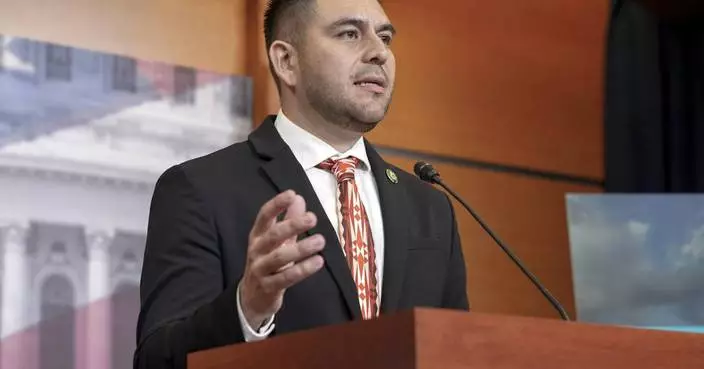Democratic U.S. Rep. Jahana Hayes has won a fourth term representing Connecticut, dashing the hopes of Republicans who saw an opportunity to flip a seat in a state where they haven’t won a congressional election in 18 years.
Hayes defeated former Republican state Sen. George Logan on Tuesday in a rematch race that closely resembled their previous battle in 2022.
“You guys did this. You organized, you mobilized, you showed up, you brought your family, you brought your friends. You did this,” she told the crowd in Waterbury. “You didn’t like that number from two years ago and you opened it up. You opened it up. So thank you. Thank you for just all of your faith in me.”
Both candidates accused the other of being too cozy with their respective party leadership in Washington and not representing the everyday interests of the northwestern Connecticut district.
In their first matchup two years ago, Hayes defeated Logan by just 2,004 votes, less than 1% of the total cast.
But Hayes, the first Black woman to represent Connecticut in Congress, had the advantage this year of sharing the ballot with Democratic Vice President Kamala Harris. She had predicted it would help drive enthusiasm for down-ballot races like her own.
The race between Hayes and Logan was among the state’s most closely watched contests on an Election Day when voters also chose state legislators and reelected a U.S. senator.
Logan, the Afro-Latino son of Guatemalan immigrants, had hoped to become the first Hispanic member of Congress from Connecticut.
He focused heavily on his personal background during the campaign, even addressing voters in Spanish during a recent debate.
He also tried to portray himself as an independent thinker who would vote for legislation that suited the district, no matter which party proposed it.
“I believe Washington is broken and needs to be fixed. I want to be part of the solution,” said Logan, a mechanical engineer who now works as a community relations director for a public water supply company.
Hayes had argued that Logan could not be trusted to protect abortion rights or to buck his own party. She touted herself as a lawmaker who has delivered for the district, in both funding and legislation. Hayes also campaigned on her support for bills to lower drug prices and address gun violence.
The race was fought in a district in the northwestern part of the state where President Joe Biden defeated former President Donald Trump by 11 points in 2020.
Logan said he would vote for Trump, but he has walked a careful line on the campaign trail.
He avoided talking about the Republican presidential nominee or aligning himself with Trump’s policies and the MAGA movement. Instead, he spoke repeatedly about being focused on the needs of the district and not the contentious presidential race, pledging to be an “independent voice” who would work with whoever won the White House.
The race was mostly a reboot of 2022, with Logan even reusing some of his same advertising. He criticized Hayes for voting “with the failed Biden-Harris administration 99% of the time” and focused heavily on economic issues.
Hayes accused him of being a risk to abortion rights and siding with “extremist” Republicans in Washington. Logan said he supports abortion rights. Connecticut has been challenging territory for Republicans in recent decades. The last Republican to win a House seat representing the state was former U.S. Rep. Chris Shays, who was voted out of office in 2008.
Incumbent Democrats in the state’s other four congressional districts all won their bids for reelection. U.S. Rep. Joe Courtney, in the eastern part of the state, won a 10th term in a rematch race against former Republican state Rep. Mike France, whom he beat by 18 points two years ago. U.S. Rep. Rosa DeLauro won an 18th term; U.S. Rep. John Larson won a 14th term; and U.S. Rep. Jim Himes won a ninth term.
Sen. Chris Murphy won a third term in a rematch against Republican Matt Corey, a small business owner who has pitched himself as “the fighter Donald Trump needs by his side.” The last Republican senator from Connecticut was Lowell Weicker, who lost in 1988 and later left the party.
“I’m here to say thank you and I’m here to pledge to the state of Connecticut that in my third term, there will not be a single day that I won’t look upon this opportunity as the greatest gift of my life,” Murphy told supporters in Hartford.
All state legislators are also up for reelection this year. Democrats currently hold a two-thirds majority in the state Senate but are just short in the House of Representatives. If they secure a net gain of three House seats, without losing any Senate seats, Democrats will have a supermajority in the General Assembly needed to override a gubernatorial veto.

U.S. Rep. Jahana Hayes, D-Conn., waves to voters on Election Day, Tuesday, Nov. 5, 2024, in Danbury, Conn. (Jessica Hill/Hartford Courant via AP)

Republican U.S. House candidate George Logan, right, greets voters on Election Day, Tuesday, Nov. 5, 2024, in Brookfield, Conn. (Jessica Hill/Hartford Courant via AP)
WASHINGTON (AP) — Voters in Missouri cleared the way to undo one of the nation's most restrictive abortion bans in one of four victories for abortion rights advocates, while Florida defeated a similar constitutional amendment, leaving in place a law barring most abortions after the first six weeks of pregnancy.
Abortion rights amendments also passed in Colorado and Maryland. Another that bans discrimination on the basis of “pregnancy outcomes” prevailed in New York. A measure that allows more abortion restrictions was adopted in Nebraska, but the outcome of a competing measure to create a right to abortion was pending, leaving the on-the-ground fallout there uncertain.
Results were still pending in four other states with abortion measures on the ballot.
The Missouri and Florida results represent firsts in the abortion landscape, which underwent a seismic shift in 2022 when the U.S. Supreme Court overturned Roe v. Wade, a ruling that ended a nationwide right to abortion and cleared the way for bans to take effect in most Republican-controlled states.
Missouri is positioned to be the first state where a vote will undo a ban that's already in place. Currently, abortion is barred at all stages of pregnancy with an exception only when a medical emergency puts the woman's life at risk. Under the amendment, lawmakers would be able to restrict abortions past the point of a fetus’ viability — usually considered after 21 weeks, although there’s no exact defined time frame.
But the ban, and other restrictive laws, are not automatically repealed. Advocates now have to ask courts to overturn laws to square with the new amendment.
“Today, Missourians made history and sent a clear message: decisions around pregnancy, including abortion, birth control, and miscarriage care are personal and private and should be left up to patients and their families, not politicians,” Rachel Sweet, campaign manager of Missourians for Constitutional Freedom, said in a statement.
Roughly half of Missouri’s voters said abortion should be legal in all or most cases, according to AP VoteCast, a survey of more than 2,200 of the state’s voters. But only about 1 in 10 said abortion should be illegal in all cases; nearly 4 in 10 said abortion should be illegal in most cases.
Florida is the first state since Roe was overturned where abortion opponents prevailed on a ballot measure. Most voters supported the Florida measure, but it fell short of the required 60% to pass constitutional amendments in the state. Most states require a simple majority.
The result was a political win for Gov. Ron DeSantis, a Republican with a national profile, who had steered state GOP funds to the cause. His administration has weighed in, too, with a campaign against the measure, investigators questioning people who signed petitions to add it to the ballot and threats to TV stations that aired one commercial supporting it.
Marjorie Dannenfelser, president of the national anti-abortion group SBA Pro-Life America, said in a statement that the result is “a momentous victory for life in Florida and for our entire country,” praising DeSantis for leading the charge against the measure.
The defeat makes permanent a shift in the Southern abortion landscape that began when the state’s six-week ban took effect in May. That removed Florida as a destination for abortion for many women from nearby states with deeper bans and also led to far more women from the state traveling to obtain abortion. The nearest states with looser restrictions are North Carolina and Virginia — hundreds of miles away.
“The reality is because of Florida’s constitution a minority of Florida voters have decided Amendment 4 will not be adopted,” said Lauren Brenzel, campaign director for the Yes on 4 Campaign said while wiping away tears. “The reality is a majority of Floridians just voted to end Florida’s abortion ban.”
In Maryland, the abortion rights amendment is a legal change that won’t make an immediate difference to abortion access in a state that already allows it.
The Colorado measure exceeded the 55% of support required to pass. Besides enshrining access, it also undoes an earlier amendment that barred using state and local government funding for abortion, opening the possibility of state Medicaid and government employee insurance plans covering care.
A New York equal rights law that abortion rights group say will bolster abortion rights also passed. It doesn’t contain the word “abortion” but rather bans discrimination on the basis of “pregnancy outcomes, and reproductive healthcare and autonomy.” Sasha Ahuja, campaign director of New Yorkers for Equal Rights, called the result “a monumental victory for all New Yorkers” and a vote against opponents who she says used misleading parental rights and anti-trans messages to thwart the measure.
Until Tuesday, abortion rights advocates had prevailed on all seven measures that have appeared on statewide ballots since the fall of Roe.
The abortion rights campaigns have a big fundraising advantage this year. Their opponents’ efforts are focused on portraying the amendments as too extreme rather than abortion as immoral.
Currently, 13 states are enforcing bans at all stages of pregnancy, with some exceptions. Four more bar abortion in most cases after about six weeks of pregnancy — before women often realize they’re pregnant. Despite the bans, the number of monthly abortions in the U.S. has risen slightly, because of the growing use of abortion pills and organized efforts to help women travel for abortion. Still, advocates say the bans have reduced access, especially for lower-income and minority residents of the states with bans.
The issue is resonating with voters. About one-fourth said abortion policy was the single most important factor for their vote, according to AP VoteCast, a sweeping survey of more than 110,000 voters nationwide. Close to half said it was an important factor, but not the most important. Just over 1 in 10 said it was a minor factor.
The outcomes of ballot initiatives that sought to overturn strict abortion bans in Florida and Missouri were very important to a majority of voters in the states. More than half of Florida voters identified the result of the amendment as very important, while roughly 6 in 10 of Missouri’s voters said the same, the survey found.
While the ballot questions have similar aims, each one occupies its own political circumstances.
In Nebraska, competing ballot measures made for a complicated situation. A majority of voters supported a measure that bans abortion after the first 12 weeks of pregnancy — which is in sync with current law — and allows for further restrictions. The result has not been called for the other measure, which would guarantee the right of abortion until viability. If both receive majorities, the one with the most votes would take precedence in areas where they conflict. In that case, it's also possible that some provisions of each would be added to the constitution.
In South Dakota, the measure would allow some regulations related to the health of the woman after 12 weeks. Because of that wrinkle, most national abortion-rights groups are not supporting it.
Arizona, a battleground in the presidential election, bans abortion after the first 15 weeks of pregnancy.
The ballot measure there gained momentum after a state Supreme Court ruling in April found that the state could enforce a strict abortion ban adopted in 1864. Some GOP lawmakers joined with Democrats to repeal the law before it could be enforced.
Measures maintaining access also are on the ballot in Montana, where a U.S. Senate race could help determine control of the chamber, and Nevada, a battleground in the presidential election.
In Nevada, where control of the state government is divided, the ballot measure would have to be passed this year and again in 2026 to take effect.
Associated Press reporters Hannah Fingerhut and Amanda Seitz contributed to this article.
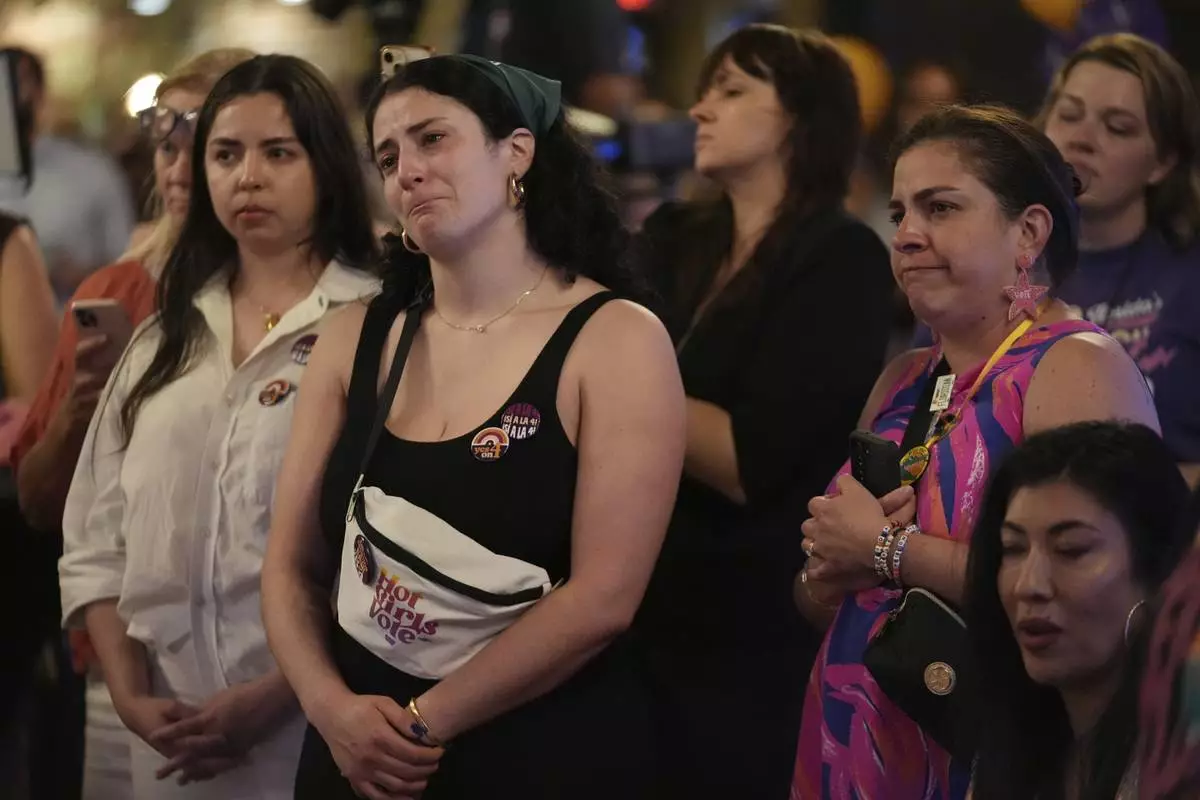
Supporters of Florida's Amendment 4, which would have enshrined abortion rights in the state, react after the amendment's defeat, during a watch party for the Yes On 4 campaign, on Election Day, Tuesday, Nov. 5, 2024, in St. Petersburg, Fla. (AP Photo/Rebecca Blackwell)

CORRECTS LANGUAGES TO MATCH AP STYLE - Anti-abortion Catholic Sonja Kahkonen waves to passing cars as she holds a "Vote No on 4" sign, urging voters to reject Amendment 4, which would enshrine abortion rights in the state, on Election Day, Tuesday, Nov. 5, 2024, outside a polling place at the Coliseum in St. Petersburg, Fla. (AP Photo/Rebecca Blackwell)
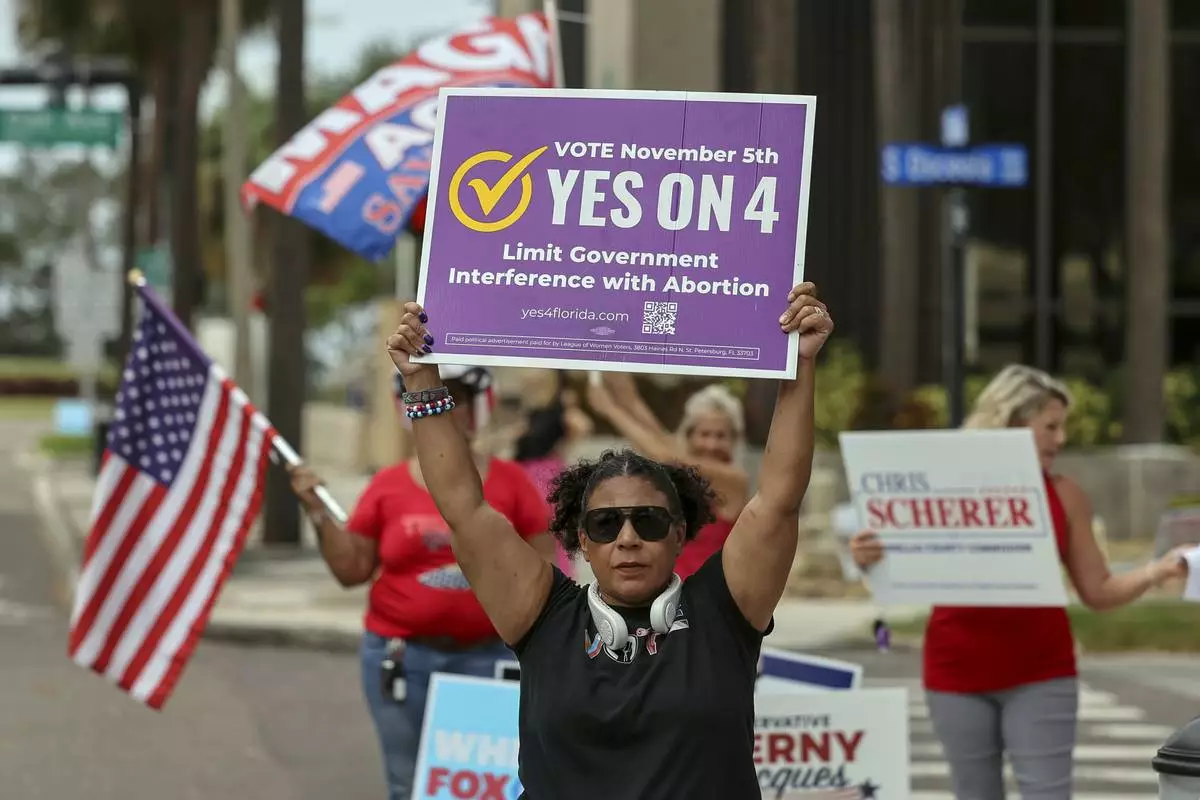
Beth Weinstein rallies in supporter of Yes on Amendment 4 regarding abortion in Florida outside of the polling place at the courthouse on Tuesday, Nov. 5, 2024, in Clearwater, Fla. (AP Photo/Mike Carlson)

FILE - Members of the gallery watch the vote count on the board, Wednesday, May 1, 2024, at the Capitol in Phoenix, as Democrats secured enough votes in the Arizona Senate to repeal a Civil War-era ban on abortions. (AP Photo/Matt York, File)
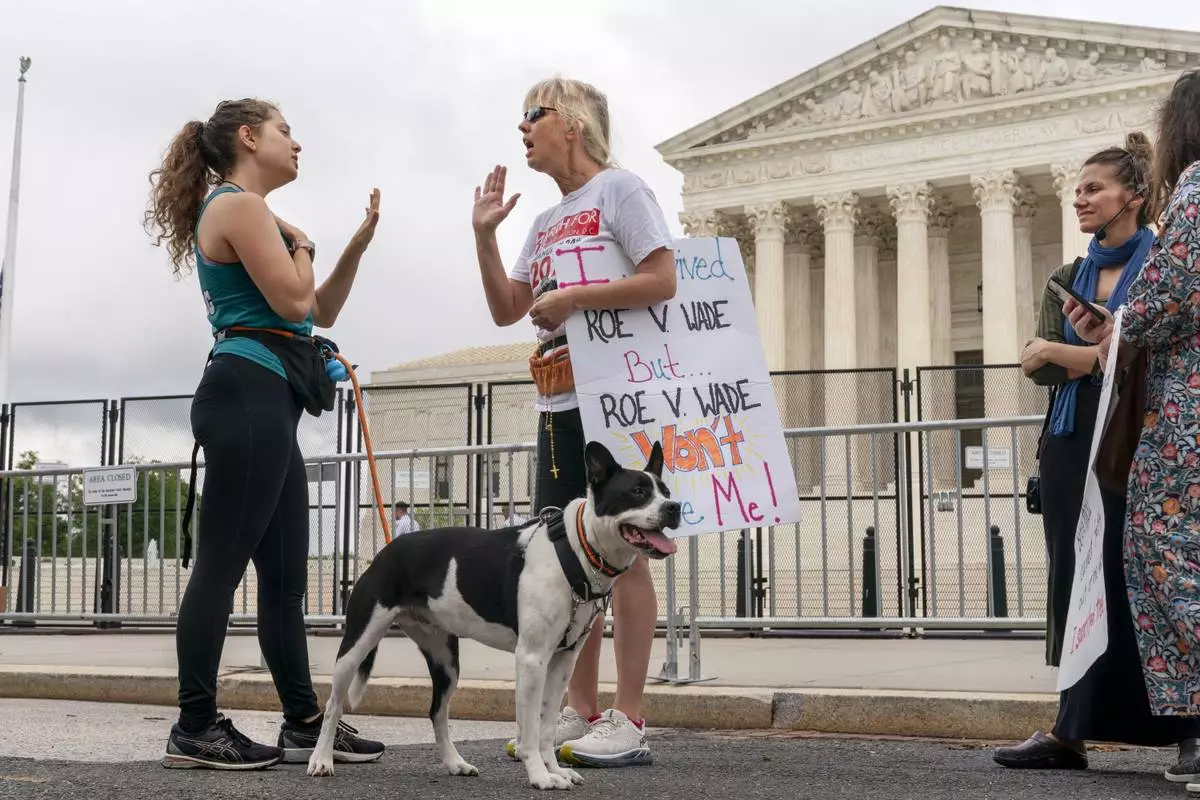
FILE - Lilo Blank, 23, of Philadelphia, left, who supports abortion rights, and Lisa Verdonik, of Arlington, Va., who is anti-abortion, talk about their opposing views on abortion rights, Friday, May 13, 2022, outside the Supreme Court in Washington, ahead of expected abortion rights rallies across the country on Saturday. (AP Photo/Jacquelyn Martin, File)
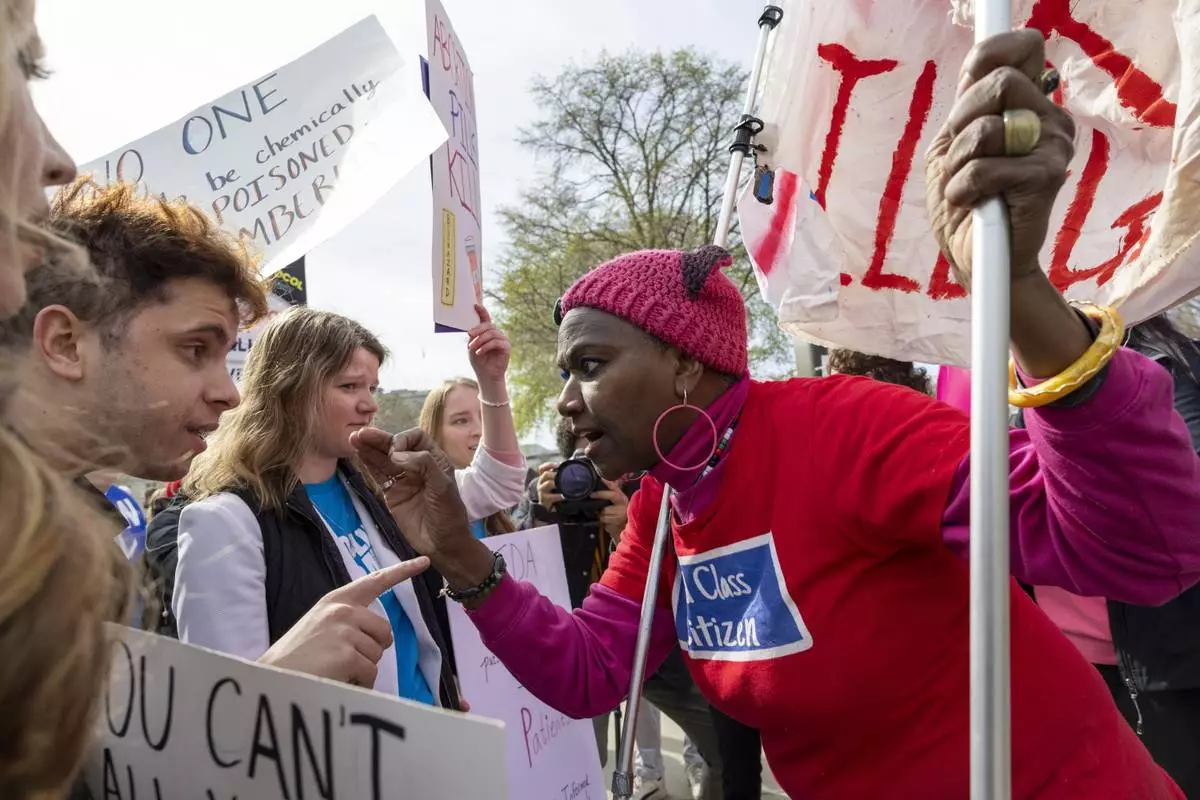
FILE - Anti-abortion activist Caleb Buck, left, argues with abortion-rights activist Nadine Seiler outside the Supreme Court, Tuesday, March 26, 2024, in Washington. (AP Photo/Amanda Andrade-Rhoades, File)
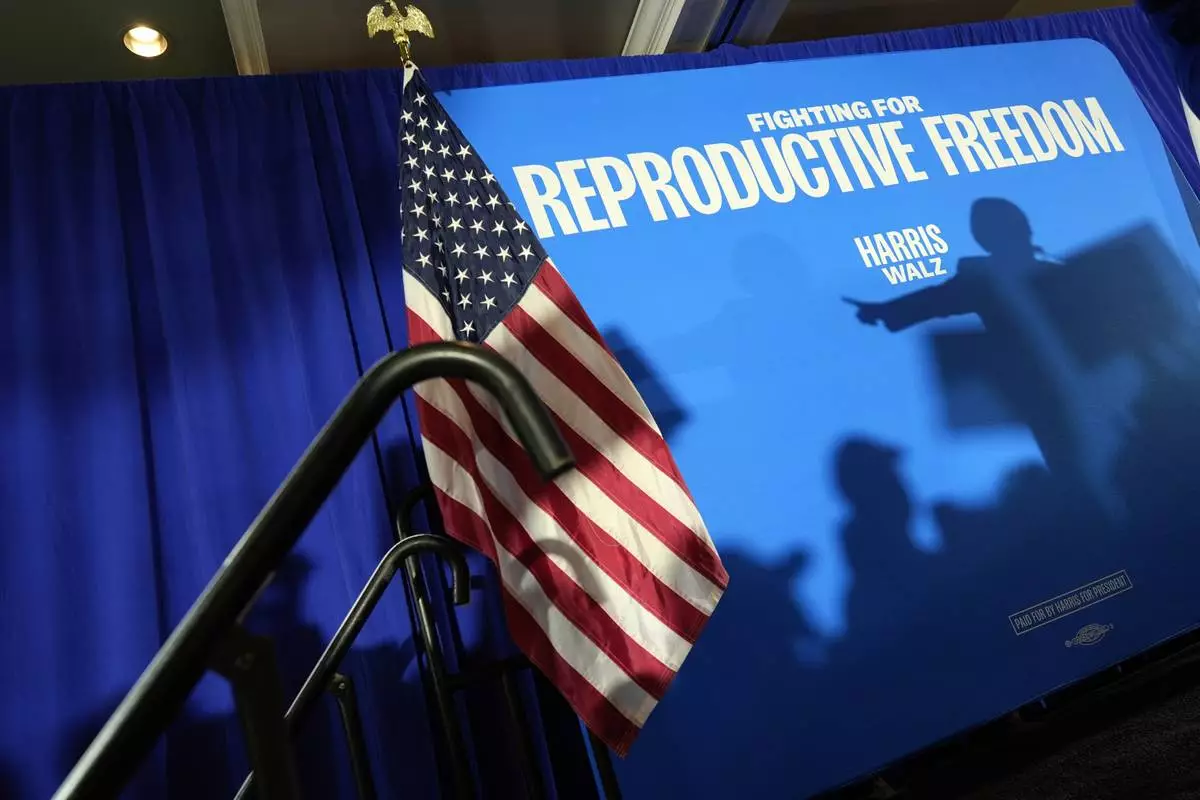
FILE - The shadow of Sen. Amy Klobuchar, D-Minn., is cast on a backdrop as she speaks at an event kicking off a national "Reproductive Freedom Bus Tour" by the campaign of Democratic presidential nominee Vice President Kamala Harris and running mate Gov. Tim Walz, Tuesday, Sept. 3, 2024, in Boynton Beach, Fla. (AP Photo/Rebecca Blackwell, File)
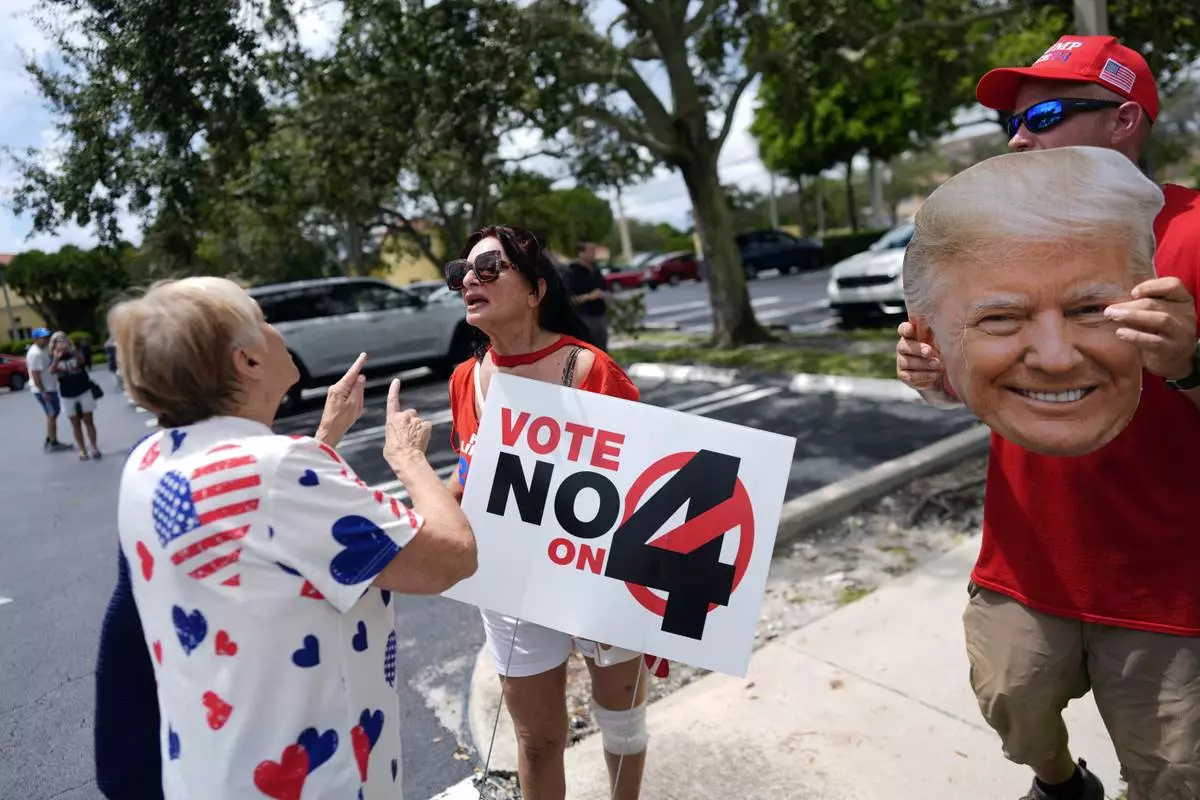
FILE - A supporter of Democratic presidential nominee Vice President Kamala Harris, left, argues about abortion rights with supporters of Republican presidential nominee former President Donald Trump, protesting alongside an event kicking off a national "Reproductive Freedom Bus Tour" by the Harris-Walz campaign, Tuesday, Sept. 3, 2024, in Boynton Beach, Fla. (AP Photo/Rebecca Blackwell,File)
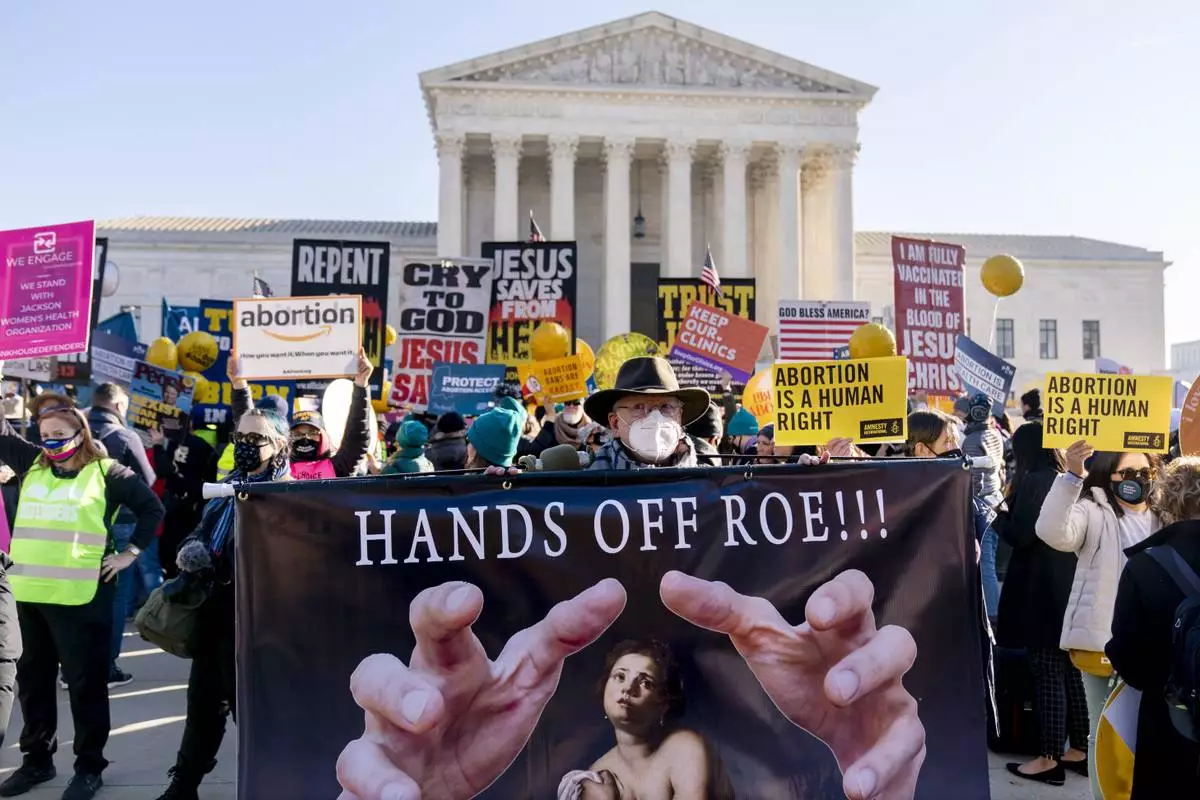
FILE - Stephen Parlato of Boulder, Colo., holds a sign that reads "Hands Off Roe!!!" as abortion rights advocates and anti-abortion protesters demonstrate in front of the U.S. Supreme Court, Wednesday, Dec. 1, 2021, in Washington. (AP Photo/Andrew Harnik, File)
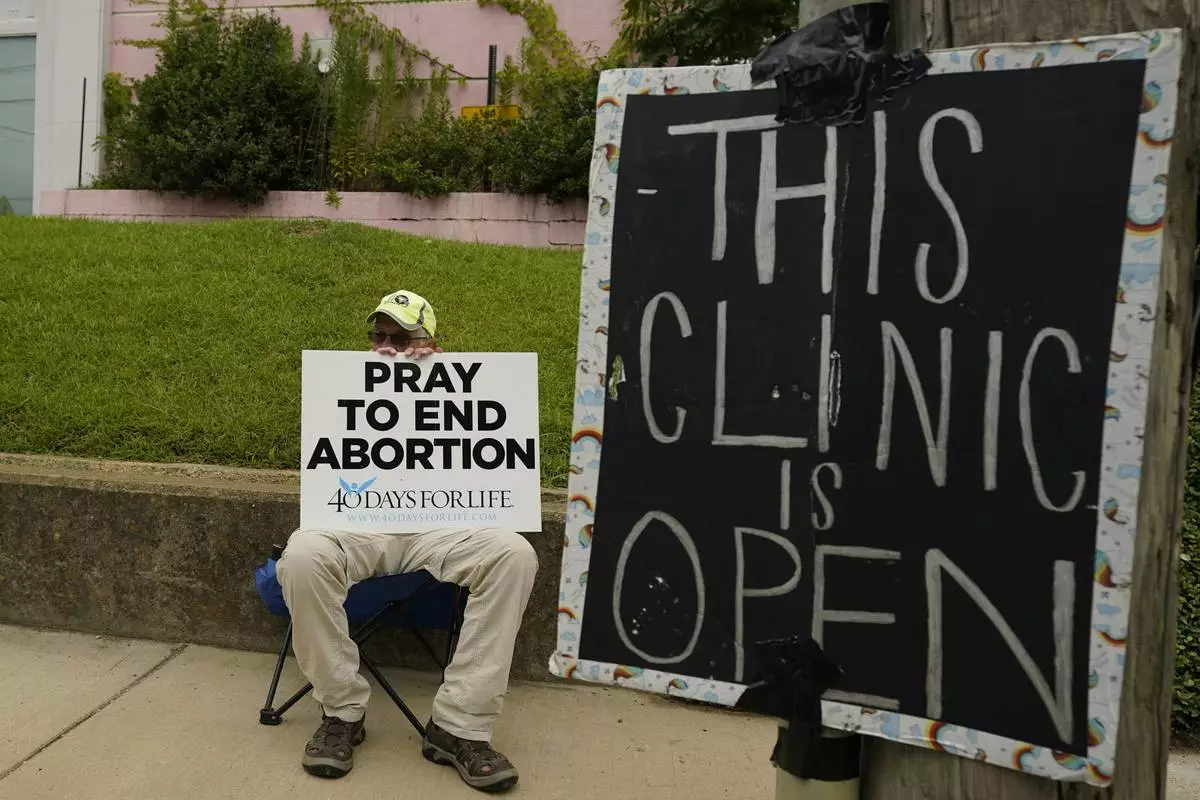
FILE - An anti-abortion supporter sits behind a sign that advises the Jackson Women's Health Organization clinic is still open in Jackson, Miss., Wednesday, July 6, 2022. (AP Photo/Rogelio V. Solis, File)
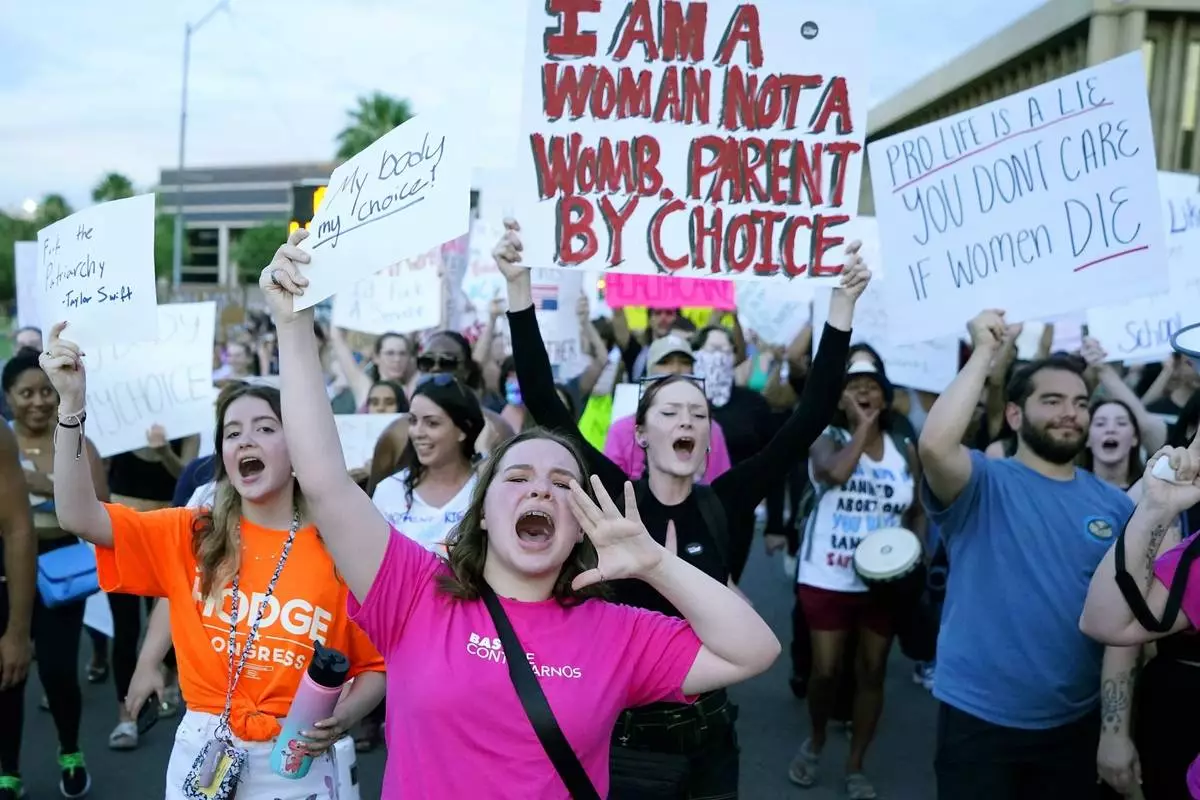
FILE - Protesters join thousands marching around the Arizona Capitol in Phoenix, protesting the U.S. Supreme Court's decision to overturn Roe v. Wade, June 24, 2022. (AP Photo/Ross D. Franklin, File)
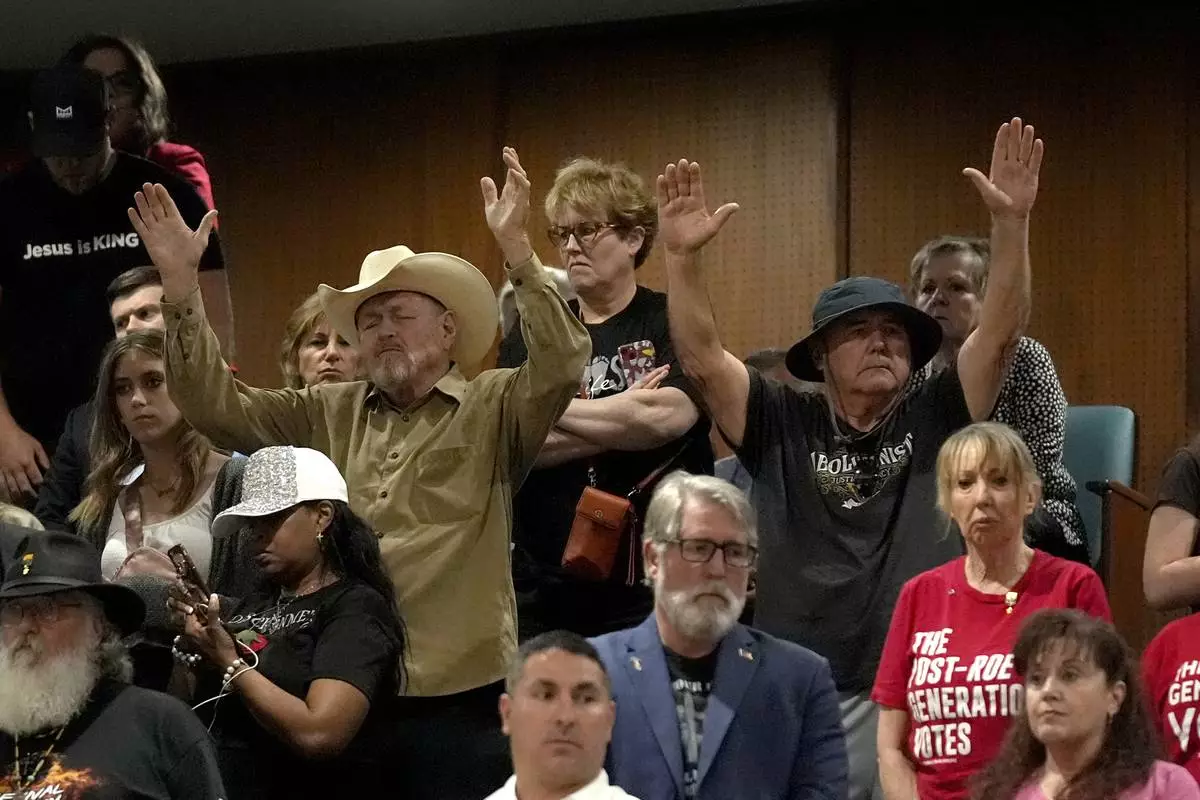
FILE - Predominantly anti-abortion supporters stand in the Arizona House gallery during the vote on the proposed repeal of Arizona's near-total ban on abortions prior to winning approval from the state House Wednesday, April 24, 2024, in Phoenix. (AP Photo/Ross D. Franklin, File)
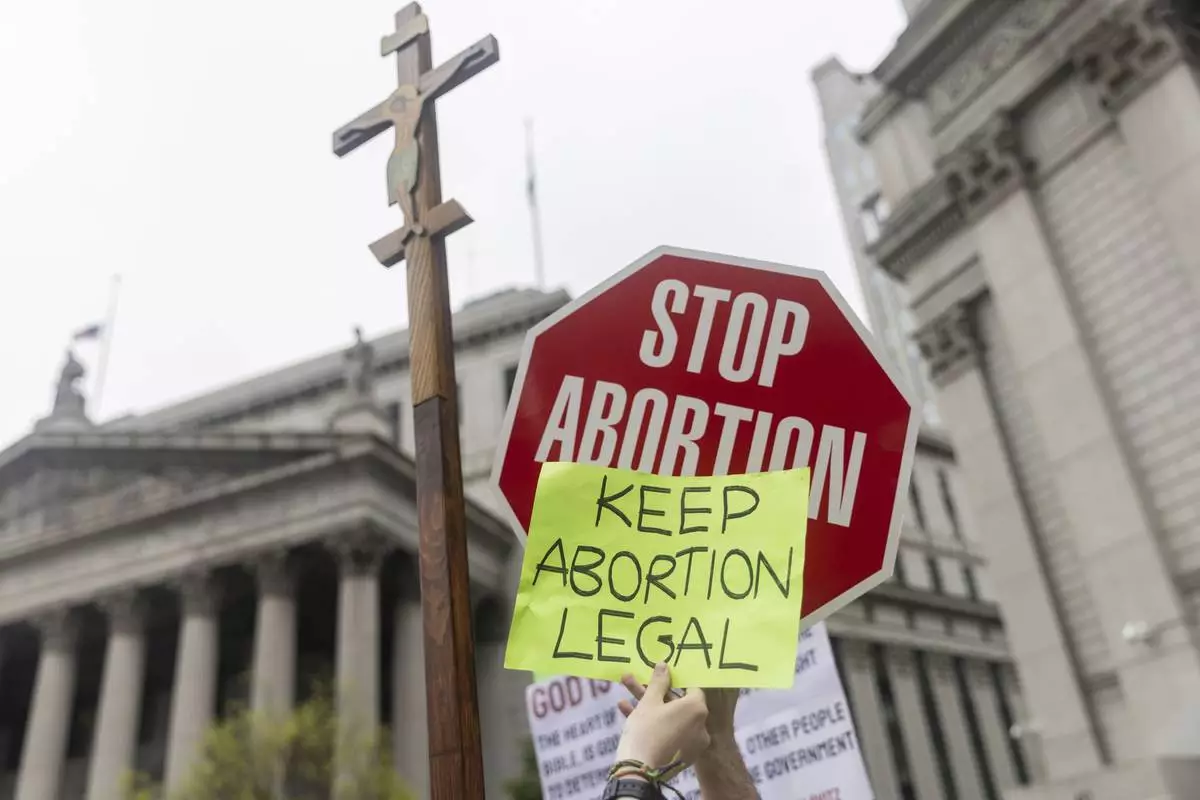
FILE - Protesters hold competing signs outside Manhattan federal court during an abortion-rights demonstration in New York, Saturday, May 14, 2022. (AP Photo/Jeenah Moon, File)























